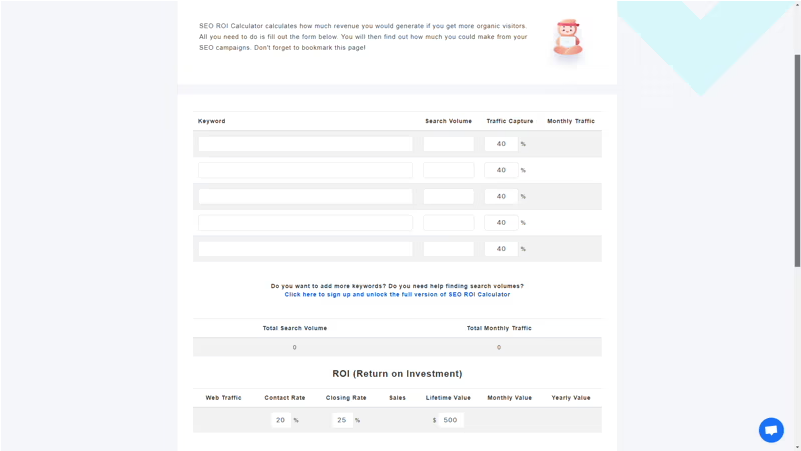Understanding & Measuring SEO ROI: Metrics That Matter

Understanding SEO ROI: Why Measuring It Matters
SEO ROI, or Search Engine Optimization Return on Investment, is a metric that measures the profit generated by SEO efforts. Measuring SEO ROI is crucial for determining the success of your SEO strategy and making informed decisions about your marketing budget. By demonstrating the value of organic search traffic to stakeholders, you can secure additional resources for your SEO efforts and improve your overall marketing performance.
In order to measure SEO ROI, you need to calculate the gain from your investment and subtract the cost of your investment. The formula for calculating SEO ROI is: ([Gain from Investment] – [Cost of Investment]) / [Cost of Investment] * 100.
Defining SEO ROI: The Formula to Use
The formula for calculating SEO ROI includes two main components: gain from investment and cost of investment. Gain from investment can include metrics such as revenue or conversions generated from organic search traffic. Cost of investment includes the time and money spent on SEO efforts, such as hiring an agency or purchasing SEO tools.
Here's an example of how to use the formula to calculate SEO ROI: Let's say you spent $1,000 on SEO efforts and generated $5,000 in revenue from organic search traffic. Using the formula, your SEO ROI would be: ([$5,000] – [$1,000]) / [$1,000] * 100 = 400%. This means that for every dollar spent on SEO, you generated four dollars in revenue.

Tracking Key SEO Metrics: Organic Traffic and Conversions
In order to calculate SEO ROI, you need to track organic traffic and conversions as key SEO metrics. Organic traffic refers to the number of visitors who arrive at your website through search engine results. Conversions refer to the number of visitors who take a desired action on your website, such as making a purchase or filling out a contact form.
To set up tracking for organic traffic and conversions, you can use tools like Google Analytics. Google Analytics allows you to track key SEO metrics and visualize your data through charts and graphs. By regularly monitoring your organic traffic and conversion rates, you can identify trends and make data-driven decisions about your SEO strategy.
Valuing Organic Traffic: Assigning a Dollar Amount
Valuing organic traffic can be challenging, but it's an important step in calculating SEO ROI. One method for assigning a dollar amount to organic traffic is to calculate the lifetime value of a customer. The lifetime value of a customer is the total amount of revenue that a customer is expected to generate over the course of their relationship with your business.
To calculate the lifetime value of a customer, you need to consider factors such as the average purchase value, the frequency of purchases, and the length of the customer relationship. By assigning a dollar amount to organic traffic, you can better understand the value of your SEO efforts and make informed decisions about your marketing budget.
Calculating the Cost of SEO: In-House vs. Agency
The cost of SEO can vary depending on whether you choose to handle your SEO efforts in-house or hire an agency. In-house SEO efforts may include the cost of hiring and training staff, purchasing SEO tools, and investing in ongoing education.
On the other hand, hiring an agency may include the cost of monthly retainer fees, project-based fees, or hourly rates. By accurately calculating the cost of SEO, you can determine the ROI of your SEO efforts and make informed decisions about your marketing budget.
Comparing SEO ROI to Other Marketing Channels
Comparing SEO ROI to other marketing channels is important for understanding the overall performance of your marketing strategy. While SEO can be a highly effective marketing channel, it's important to consider the benefits and drawbacks of other channels such as PPC, social media, and email marketing.
When comparing SEO ROI to other marketing channels, consider factors such as the cost of each channel, the potential reach, and the level of engagement. By understanding the ROI of each channel, you can allocate your marketing budget more effectively and improve your overall marketing performance.
Maximizing SEO ROI: Tips and Strategies
Maximizing SEO ROI requires ongoing effort and experimentation. Some tips and strategies for maximizing SEO ROI include optimizing for long-tail keywords, improving site speed, and regularly auditing your SEO efforts.
Additionally, it's important to keep up-to-date with the latest SEO trends and best practices. By testing and experimenting with new SEO strategies, you can improve your ROI and stay ahead of the competition.
Tools for Measuring SEO ROI: Google Analytics and Beyond
Using tools to measure SEO ROI like SEO ROI Calculator is essential for accurately tracking your data and making informed decisions about your marketing strategy. Google Analytics is a powerful tool for measuring SEO ROI, but there are also other tools and resources available such as SEMrush and Ahrefs.
When choosing a tool for measuring SEO ROI, consider factors such as the cost, the features, and the level of support. By using the right tools, you can accurately track your SEO metrics and improve your overall marketing performance.
Common SEO ROI Pitfalls and How to Avoid Them
There are several common pitfalls to avoid when measuring SEO ROI, such as not accurately tracking organic traffic or not considering the full cost of SEO. To avoid these pitfalls, it's important to regularly audit your SEO efforts and use accurate tracking methods.
Additionally, it's important to consider the full cost of SEO, including the time and money spent on SEO efforts. By accurately calculating the cost of SEO, you can determine the ROI of your SEO efforts and make informed decisions about your marketing budget.
Case Studies: Successful SEO ROI Measurement
Case studies of businesses that have successfully measured and improved their SEO ROI can provide valuable insights and inspiration. By studying the strategies and tactics used by these businesses, you can apply similar approaches to your own SEO efforts and improve your overall marketing performance.
SEO ROI Best Practices: Expert Opinions
Expert opinions on SEO ROI best practices can provide valuable insights and guidance. By following best practices such as regularly auditing your SEO efforts and using accurate tracking methods, you can improve your ROI and stay ahead of the competition.
The Future of SEO ROI: Trends and Predictions
Trends and predictions for the future of SEO ROI include the increasing importance of voice search and artificial intelligence. By staying up-to-date with the latest trends and predictions, you can adapt your SEO strategy and improve your overall marketing performance.

Recap: Key Takeaways for Measuring SEO ROI
In order to measure SEO ROI effectively, it's important to accurately track organic traffic and conversions, consider the full cost of SEO, and regularly audit your SEO efforts. By following these key takeaways, you can improve your ROI and make informed decisions about your marketing budget.
Measuring SEO ROI can provide valuable insights into the success of your SEO strategy and help you make informed decisions about your marketing budget. By following best practices and staying up-to-date with the latest trends and predictions, you can improve your overall marketing performance and stay ahead of the competition.



